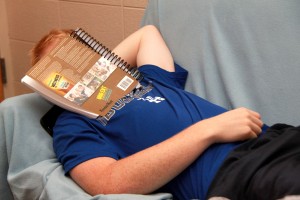The cost of not sleeping
by Abby Musser – Horizon News Editor
It’s 8 a.m. and Alaina Beatty, a business and math major, has just sat down for her first class. She blearily glances around the room, barely acknowledging her classmates. It’s just as well, they are too busy yawning to say good morning. Everyone has dark half circles under their eyes. Alaina wonders if hers are just as prominent. She notices how hard it is to keep her eyes open when the teacher begins the lecture.

If this seems familiar, you’re not alone. In fact, an article in last week’s Huffington Post reported on a study concluding that “students are twice as likely to be sleep deprived as the general population.”
Researchers Dr. Adam Knowlden and Dr. Manoj Sharma say that students who are not getting enough sleep are having a hard time balancing classes, athletics, employment, and a social life .
But freshman like Beatty seem to struggle with this more than anyone.
Often, it’s because they’re afraid to choose sleep over social opportunities.
“I am usually doing homework and then my friends usually convince me to go down to the Nest,” Beatty said. “So after I get back I have to finish my homework.”
What students don’t seem to realize is how much a sleep deficiency can actually hurt them throughout the school year.
Donovan Tann, English faculty, has seen the effects of sleep loss firsthand. He says that students who do not get enough sleep the night before are “less sharp overall.”
Ashenafi Tadese, a sophomore, can relate. He says he’s usually awake until 2 a.m. or later depending on the amount of homework he has that night. That makes his 7:15 a.m. wake-up time pretty agonizing.
Like a lot of students at Hesston, Ashenafi is also an athlete. If he does not get enough sleep the night before, then he is not doing himself any favors. Ashenafi has noticed this.
“I don’t have as much drive when playing sports,” he said. “My reaction time is definitely not the same.”
Students who are struggling to juggle school, friends, work , and sleep might also be feeling the strain physically. Research from the University of St. Thomas in St. Paul, Minnesota has shown that poor sleep patterns could be linked to recurrent health problems. Both Dr. Roxanne Pritchard and Monica Hartmann, the people who led the study, also claim that sleep problems have the same impact on a student’s GPA as binge drinking and marijuana use would. They have also concluded that students who get sufficient sleep are healthier both physically and psychologically.
So by 1 a.m., when Beatty is finally finishing her macroeconomics, she stifles a yawn and picks up her calculus book. If she is lucky she will be done before 2 a.m. Maybe she can get a couple of hours of sleep before her alarm goes off at 6:30 a.m.




